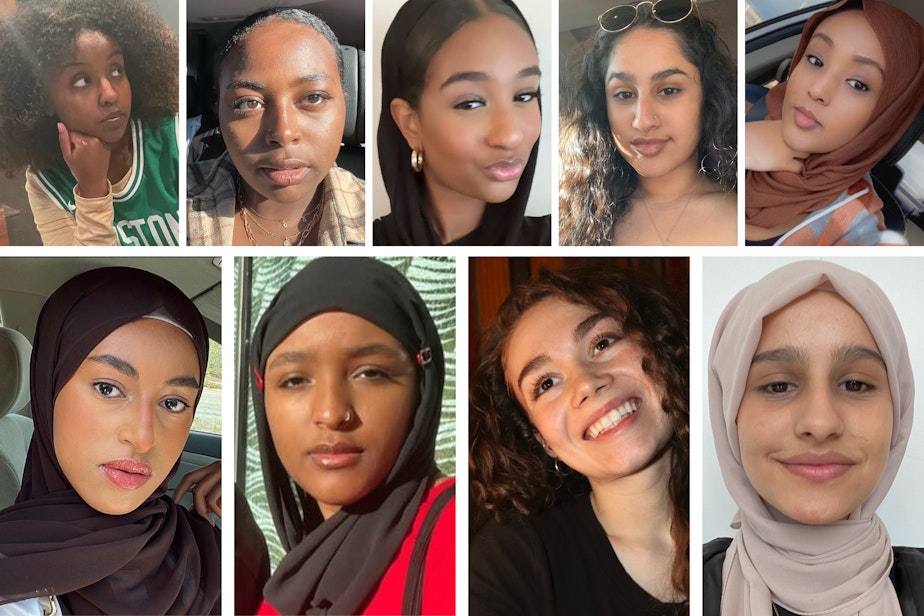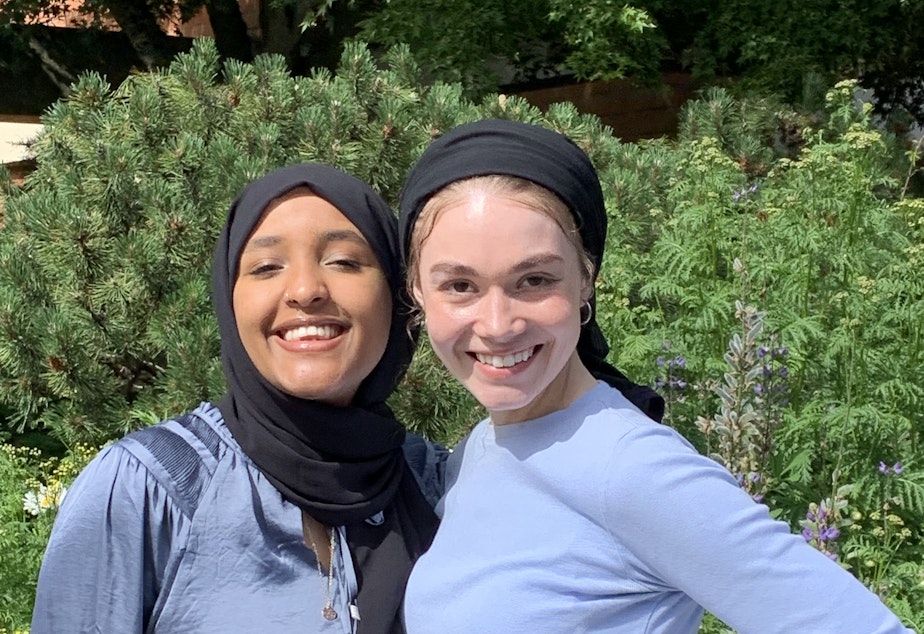Is wearing makeup creative self-expression or a social demand?

If you wear makeup, you've likely gotten mixed messages about the right way to wear it, or if it's OK to wear it at all.
People of all ages and genders wear makeup. But RadioActive's Najuma Abadir was especially interested in how conflicting messages around makeup can affect young women like her.
[RadioActive Youth Media is KUOW's radio journalism and audio storytelling program for young people. This story was entirely youth-produced, from the writing to the audio editing.]
I
remember the first time I got mixed messages about makeup.
I was about 8 years old, and it was my sister's graduation party. She was putting on makeup; I was wearing a black and green dress. I looked over at her eyeshadow palette and noticed a sparkly green shade. I begged her to let me try some. I was so excited — I had never worn makeup before.
As I walked out to meet all the guests, I just felt so cool! Like I was a pop star walking out on stage to meet all my fans. But a family member I barely knew stopped me immediately. He told me to take it off and never wear makeup again. It was a strange feeling, from being so excited with my sister, to having someone tell me that what I was wearing was wrong.
Sponsored
My relationship with makeup is something I’m still trying to figure out. I wanted to talk to someone else who’s been through it, so I turned to my friend Johannah Twa for her perspective. She’s 22 years old and someone I look up to.
Johannah came from a very religious and conservative family that didn't like the idea of makeup. She said she was never allowed to wear makeup as a child. But as she got older, she started wearing it anyway.
"I did what everyone did, you know, the three layers of blue eyeshadow," Johannah said. "I had a lot of fun experimenting with makeup, but also I think it came at a time where I was dealing with immense insecurity. I had a lot of hormonal acne, and so I would try my best to cover it up with powders and foundations."
Johannah’s introduction to makeup is a familiar one. Many young women feel like they have to wear makeup, and usually in a particular way.
Sponsored
"You know, now everyone wants to be gleaming, everyone wants to be glowy," Johannah said. "But in the past, everyone wanted to have a powdered face, no oil, no shine."
Johannah said that it just took time to find the routine that worked for her.
I felt like I could relate to everything Johannah said.
But there was one big piece that I didn’t relate to at all. Johannah is a white woman with European features. She said part of her privilege is that she doesn't feel pressured to contour her face or make her nose slimmer.
"One thing that probably plays a huge role in my relationship with makeup is that I already fit a [Eurocentric] standard of beauty that is acceptable and desired in Western culture," she said.
Sponsored
But I was someone who felt like I had to change to fit into that standard. I felt like I had to have a sharper nose or lighter skin. Social media played a big part in that.
At first, I used to wear a lot more makeup because it was something I saw on everyone around me and online. But I didn’t always feel comfortable. During the pandemic, I was able to experiment to see what worked for me. Both my circle of friends and time really helped me unlearn it all. And now my routine is a lot more simple.
My makeup routine goes: under-eye eyeliner, concealer, mascara, and eyebrow gel. And glitter in the corner of my eyes — that part is essential.
I was curious about Johannah’s routine.
"My makeup routine is pretty basic," she said. "I wear sunscreen. And sometimes I'll do under-eye, some liner, and I like mascara a lot because my eyelashes are pretty light. And I love doing my brows because they're curly and they go everywhere."
Sponsored
Although I have a routine I like, I can’t always ignore all the opinions of other people. It’s hard when some people think makeup is cool, and some people think you wear it because you’re insecure, and some people think women wear makeup for male attention.
"We need to wear just enough makeup to be beautiful and to meet a standard, but not enough that it's really visible," Johannah said. "I feel like there's no way to get around it. It's like you're damned if you do and damned if you don't."
Makeup is a really cool outlet that people have to explore and be creative, regardless of what everyone thinks. Even though it feels like you have to keep up, trends don’t always have to be a bad thing. You can open up Instagram, Pinterest, or TikTok and see something that you want to explore.
I think makeup is an art form. And with these trends, you can be inspired to try something new.
I want every young woman like me to find their personal relationship with makeup, including no relationship at all. Women should be free to express themselves in whatever way they want, free of criticism and free of judgment.
Sponsored
This story was produced in a RadioActive Youth Media Advanced Producers workshop for high school and college-age youth. Production assistance by Kyle Norris and Charlotte Engrav. Prepared for the web by Kelsey Kupferer. Edited by Liz Jones.
Find RadioActive on Instagram, Twitter, TikTok, YouTube and Facebook, and on the RadioActive podcast.
Support for KUOW's RadioActive comes from the Bill & Melinda Gates Foundation Discovery Center and BECU.
If you have any feedback on this story, you can email RadioActive at radioactive@kuow.org, or click the teal feedback tab on the edge of this page. Reach out, we're listening.




